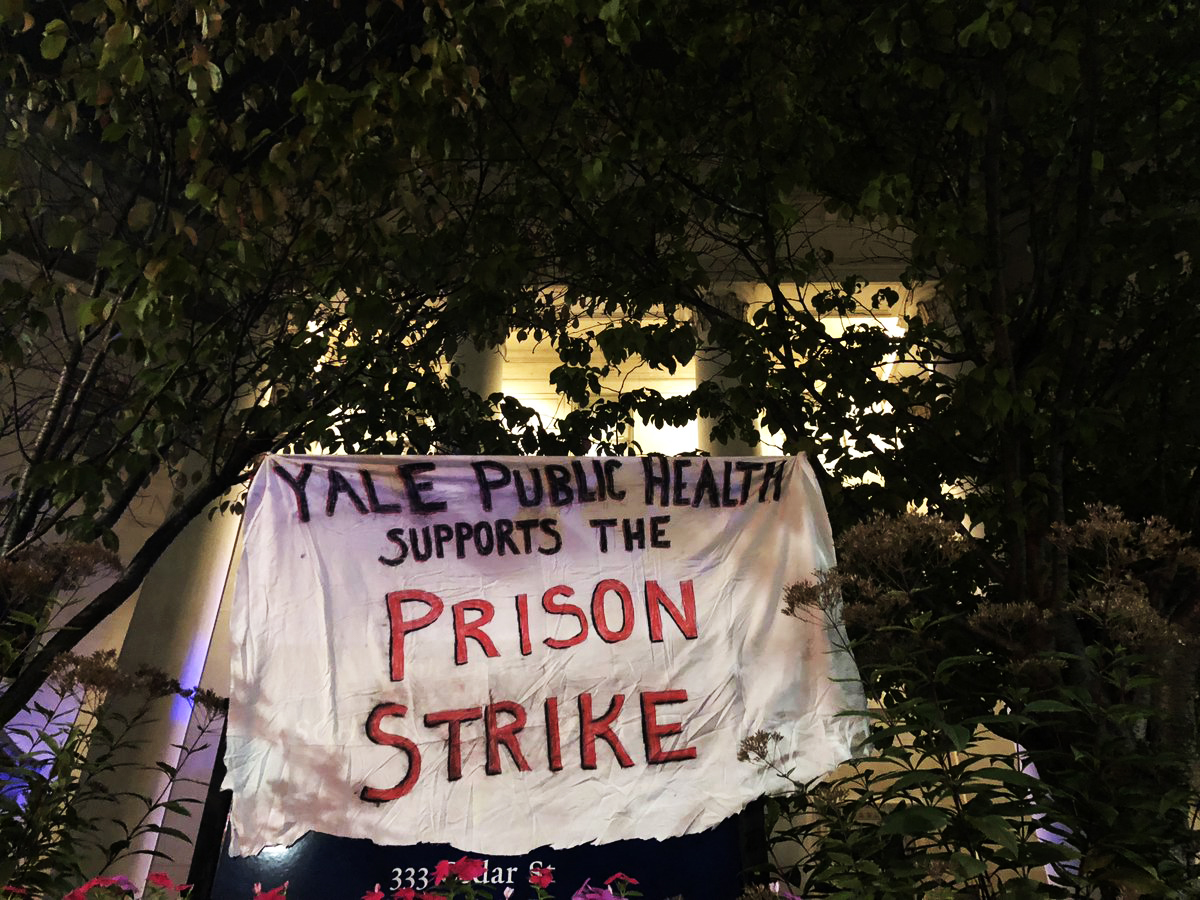
Courtesy of Eli Feasley
On Sept. 9 banners were dropped at the Yale Law School, Yale Divinity School and Yale School of Medicine in solidarity with the 2018 Prison Strike. The Yale Abolitionist Coalition had formally announced its creation.
The prison strike — which took place from Aug. 21 to Sept. 9 — was a countrywide movement protesting human rights violations in prisons. An alliance of graduate professional students, the coalition is dedicated to abolishing prisons through organizing and direct action. Displayed in black and red capital letters, the three banners dropped by the Yale Abolitionist Coalition read “Yale Law students support Prison Strike,” “Yale Public Health supports the Prison Strike” and “Yale Divinity solidarity with Prison Strike.” The banners, written on a large cloth, were displayed in front of their respective graduate school buildings.
Coalition member Eli Feasley LAW ’21, said that many of the group’s members have done work on behalf of the prison strike, including writing letters and attending rallies. The group is in the process of coming up with Yale-specific demands and organizing more initiatives within and across University schools to build the coalition.
“Prison is a moral nightmare and the U.S. prison system in particular is arguably the largest single source of human suffering on this planet today,” Feasley said. “We live in a society undergirded by this racist system of oppression and it’s up to us to dismantle it. As Yale students, we have a duty to dismantle this system.”
Coalition members want to utilize the resources they have access to and the skills they are developing at Yale to end mass incarceration, Feasley added.
The prison strike was spearheaded by Jailhouse Lawyers Speak, a national organization led by incarcerated individuals, in coordination with other member organizations within the Incarcerated Workers Organizing Committee, a union for the incarcerated campaigning for prison abolition.
According to Amani Sawari, spokesperson for Jailhouse Lawyers Speak, the prison strike was motivated by a riot at the Lee Correctional Institution in South Carolina on April 15 that led to the deaths of seven people.
The organizers of the national strike released a list of 10 demands to the national government. The demands included improving prison conditions, restoring voting rights of all incarcerated citizens and ending “exploitative” labor practices in prisons, according to a Sept. 11 press release by the Prison Strike Media Team.
One coalition member Taiga Christie SPH ’19, said that supporters of labor rights have to support those rights for all people, noting that individuals who are incarcerated “should not be viewed as an exception” to fair wage laws and working condition regulations.
“By perpetuating this divide in the context of massive race disparities in incarceration rates, we are perpetuating a present-day system of slavery,” said Christie.
Yale is not the only school to be advocating on behalf of the strike.
According to Sawari, students from Harvard Law School held a prison labor awareness event on Labor Day. Sawari said a rally was also held by students at the University of Washington in Seattle to protest the university’s relationship with the correctional industries, since their classroom and dormitory furniture is made at the Washington State Penitentiary in Walla Walla.
“Once students begin to recognize the connection they have to prisoners in operating the institutions which oppress them, then they’ll see how resistance can be a legitimate pathway towards policy changes,” Sawari said.
The Incarcerated Workers Organizing Committee was founded in July 2014.
Jever Mariwala | jever.mariwala@yale.edu
Sammy Westfall | sammy.westfall@yale.edu .







